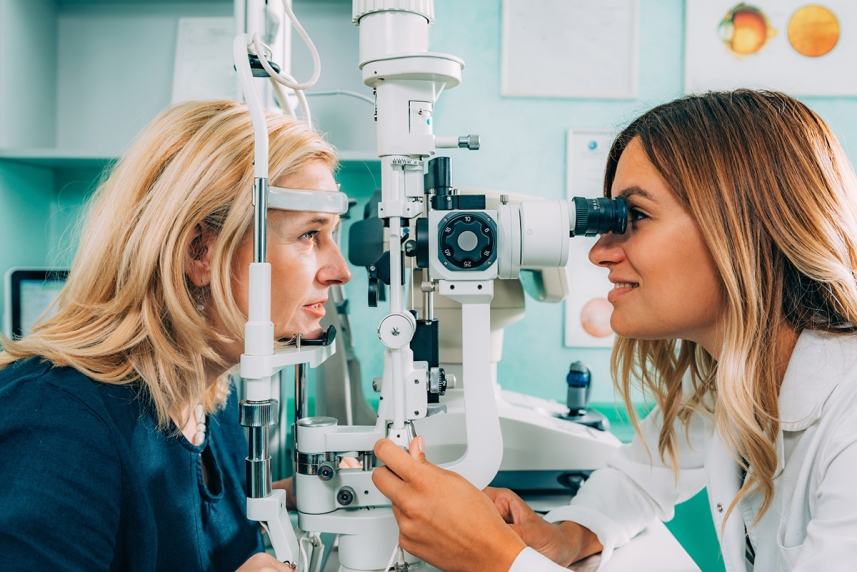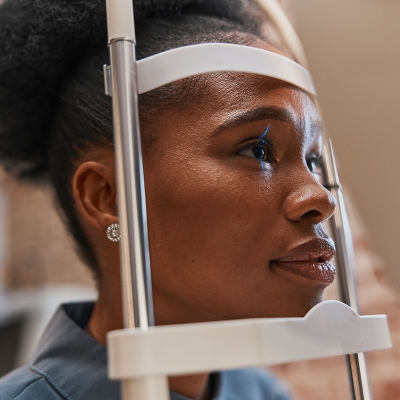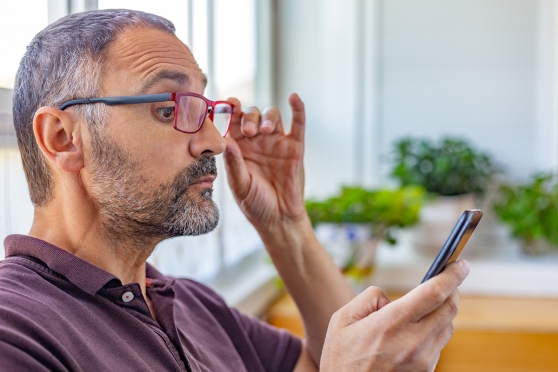3 surprising ways an eye doctor could help manage diabetes
An eye doctor could play a major role in helping people control and live with diabetes — in some unexpected ways. Here’s how.

People with diabetes may already have their health care team in place. That team will likely include their primary care doctor and maybe even an endocrinologist, a doctor who specializes in hormone-related conditions. But it may be time to add another specialist: an eye care provider.
Eye care providers could play a key role in managing diabetes, as they might often be the ones to detect diabetes before anyone else.
Learn about 3 surprising ways an eye care provider may help a patient navigate their diabetes. Also, find out why they may be an important part of any diabetes care team.
Looking for a new eye care provider? Search the UnitedHealthcare Vision Network now.
#1. Eye care providers may be the first provider to detect diabetes.
About 38 million U.S. adults have diabetes, according to the Centers for Disease Control and Prevention, and 1 in 5 of them don’t know they have the condition.1
A visit with an eye care provider is often how people find out they have diabetes. In fact, eye care providers detect hundreds of thousands of cases a year in people who have no idea they have it.2
There’s a reason for that. The symptoms of type 2 diabetes may develop slowly, over the course of years, and sometimes they show up as vision problems, such as blurriness or double vision. Those symptoms may send someone to an eye care provider.
During the visit, the eye care provider may dilate the person’s pupils in order to get a close-up look at the retina, the light sensitive layer at the back of the eye. If a person has diabetes, an eye care provider may be able to tell by these signs:3
- Inflammation or bleeding of the tiny blood vessels in the retina (diabetic retinopathy)
- Swelling of the macula, or when blood vessels leak fluid into this back part of the eye
- Glaucoma or cataracts, eye diseases that develop more quickly for people with diabetes
If the eye care provider spots any of these signs, they may be able to get the ball rolling on monitoring and treating any diabetes-related eye condition.
#2. Eye care providers may provide education to people about diabetes.
When someone is diagnosed with diabetes, it may be difficult to know what to do first, but an eye care provider may be an excellent source of information about the disease.
“We can counsel and educate the patient on the impact of blood sugar control, and the importance of getting enough physical exercise and eating healthily. Plus keep you on track with annual eye exams,” says Karen Squier, O.D. She’s chief of low vision services at Southern College of Optometry in Memphis, Tennessee.
Eye care providers may also refer patients to a diabetes self-management education and support (DSMES) program. These are designed to help people live a healthy life with diabetes. DSMES programs give patients with diabetes an opportunity to work one on one with a diabetes care and education specialist to create a personalized lifestyle plan.4
DSMES services by location may be found through the Association of Diabetes Care & Education Specialists or the American Diabetes Association.4
#3. Eye care providers play an important role in a person’s care team.
Diabetes affects the entire body — not just one part of it. So, it’s a good idea for people with diabetes to have a team of doctors to help them manage the disease, including an eye care provider.
“Diabetes management requires collaboration among medical professionals,” says Dr. Squier. “Optometrists will communicate with other doctors to keep them up to date on how the patient is doing when it comes to their diabetes and eye health.”
If the patient first learns about their diabetes from an eye care provider, they may steer them in the right direction by suggesting some next steps. That may include recommending appointments with their primary care physician and an endocrinologist.
That’s why yearly eye exams are so important for people with diabetes. They are the first line of defense in keeping your eyes healthy.5
Another line of defense? Getting all the members of the diabetes care team to talk to one another and get on the same page. That’s the best way for those with diabetes to feel they are getting the right care.
Stay on top of your eye health with an in-network provider. Search for an eye care provider now.
Sources:
- By the numbers: Diabetes in America Centers for Disease Control and Prevention, last reviewed October 2022. Accessed January 19, 2024.
- Diabetes and your eyes American Optometric Association. Accessed January 19, 2024.
- Diabetic eye problems National Library of Medicine: MedlinePlus, last updated December 2023. Accessed January 19, 2024.
- Living with diabetes: Education and support Centers for Disease Control and Prevention, last reviewed October 2023. Accessed January 19, 2024.
- Eye health: Why you should schedule your annual diabetes exam American Diabetes Association, March 2022. Accessed January 19, 2024.


